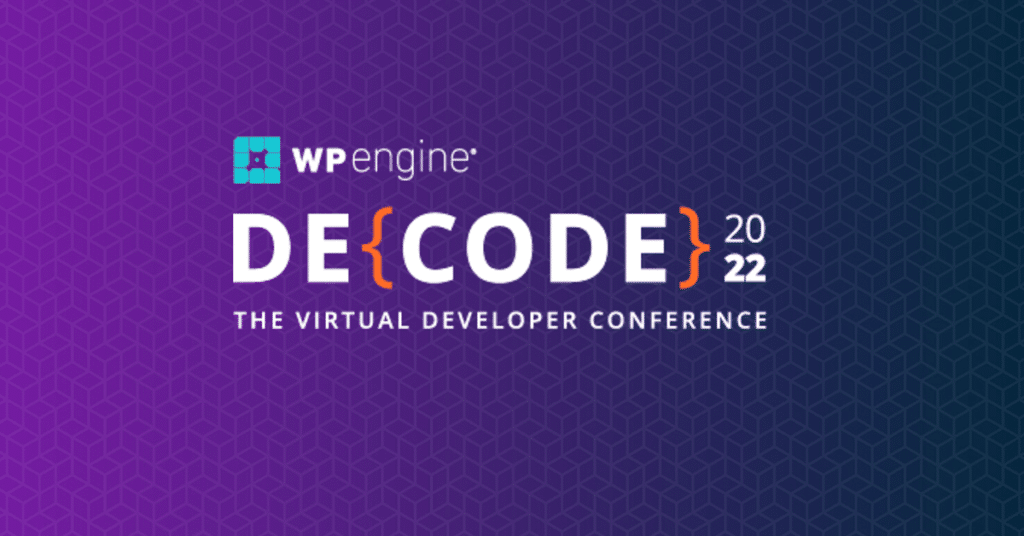
WP Engine DE{CODE} 2022: Now Available On-Demand
It’s not too late to catch all of the great content from this year’s virtual developer conference!
DE{CODE} 2022, WP Engine’s premier conference for WordPress developers, is now in the books, but that doesn’t mean it’s too late to catch up on all of this year’s great content!
If you already registered for this year’s DE{CODE} you can log in here to view all of the sessions. Otherwise, click “Still haven’t registered?” to gain access to this year’s content.
With 19 all-virtual, expert-led sessions (including keynotes) and more attendees than ever before, this year’s DE{CODE} was another massive success and it generated an outpouring of positive feedback across social media.
The agenda for DE{CODE} 2022 was created with a focus on four key areas of development most requested by previous attendees: eCommerce, headless WordPress, managed WordPress hosting, and the builder experience.
This year’s event was also jam-packed with announcements around new tools and features including the latest release of Local, Atlas Blueprints, and WP Engine’s new Site Monitoring tool.
While the live portion of DE{CODE} 2022 has wrapped up, you still have time to view all of the dynamic sessions included in this year’s event.
2022: Year of the WordPress Developer
As a WordPress developer, you’re keenly aware of what publishers need, and that expertise puts you in a unique position to better serve those requirements as they accelerate.
In the first keynote session kicking off DE{CODE} 2022, WP Engine Founder & CTO Jason Cohen walks through some of the most important publisher and site requirements (including page speed and user experience), innovative ways WordPress developers are meeting them today, as well as new tools and component-based approaches developers are already using to build the adaptive digital experiences of tomorrow.
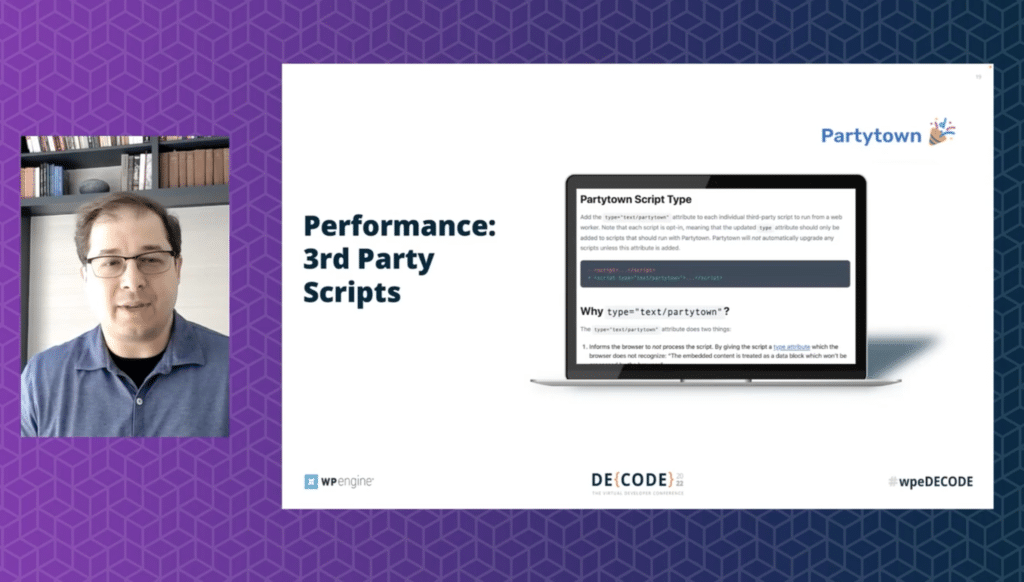
From sites that adjust to specific conditions and preferences even if a user isn’t logged in, to image optimizations, new ways of configuring user settings, CSS container queries, and the shift to thinking about web pages as components rather than an entire page, this session provides real-world, actionable information you can put to use on your WordPress sites right now and expand your impact on the sites you build and manage.
“As a WordPress developer, you already understand so much of the world, you understand how to work with publishers, how to convert their requirements into real life, how to mix code and art and make websites that are wonderful and effective.
The trick is to learn and bring in this new technology so rather than being left behind, you’re leveraging things like components, adaptive experiences, and the tools beind them.”
WP Engine Founder & CTO Jason Cohen
An Atlas of Atlas
Atlas is the complete solution for headless WordPress development, with open source tooling for page templating, data fetching, content modeling, and more. What does the current landscape of Atlas look like?
In this year’s second DE{CODE} keynote session, WP Engine Developer Relations Manager Kellen Mace and Product Manager Ilona Kędracka provide an up-close look at the products that make up the Atlas ecosystem.
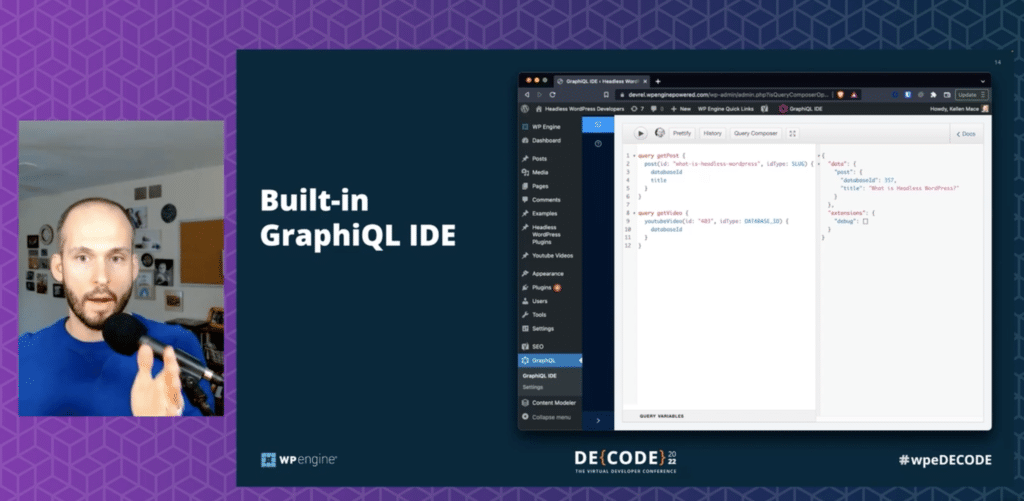
“Atlas is the name of WP Engine’s headless platform but it’s really a lot more than that—it includes a lot of products and open source offerings that make it as frictionless as possible to build and deploy sites with headless WordPress.”
WP Engine Developer Relations Manager Kellen Mace
The Atlas ecosystem includes:
Learn more about these exciting tools available to headless WordPress developers, which make crafting high-performance and secure sites faster and easier.
Be the Change: The Future of WordPress with WP Engine’s DevRel Team
WordPress 5.9 ushered in a new way of building sites with WordPress. Full Site Editing, which expands block-based functionality across an entire WordPress site, will empower builders in a way we’ve never seen before.
To help developers make a successful transition to this new way of building with WordPress, WP Engine’s Developer Relations (DevRel) team was formed to serve as a conduit between the WordPress project, its users, and those who build with it.
In this third and final keynote session from DE{CODE} 2022, WP Engine Principal Developer Advocate Brian Gardner, who heads the DevRel team, offers an in-depth look at the history of WordPress, recent updates including version 5.9 and the launches (and new features) leading up to it, as well as a preview of WordPress 6.0, which is set to launch at the end of May.
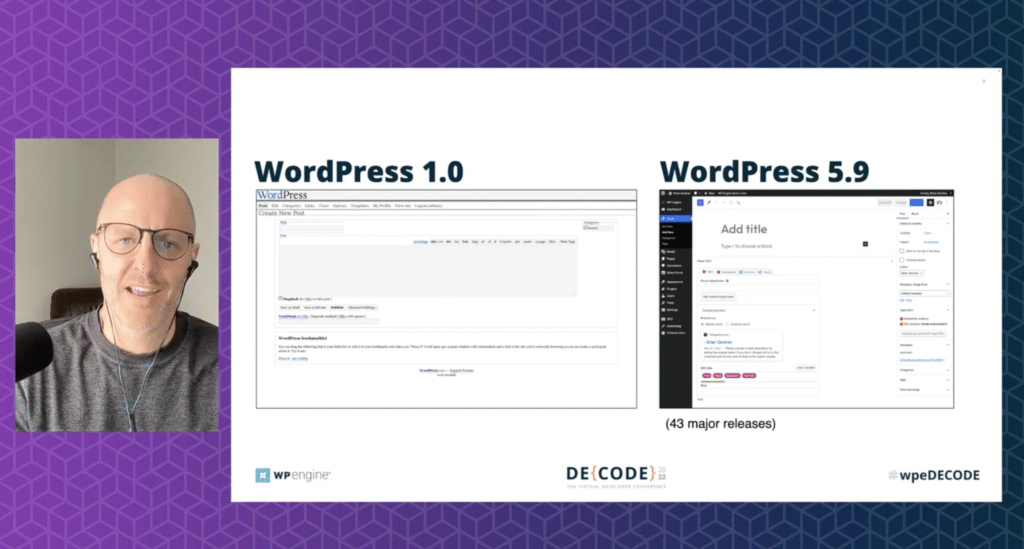
If you touch WordPress in any way, this highly informative session will bring you up to speed on some of the most important innovations currently under development in WordPress core, as well as the wide list of resources WP Engine’s DevRel team is building to help you leverage Gutenberg blocks and Full Site Editing.
“We want to cultivate an interactive and immersive WordPress community that values innovation and curiosity—where generosity is encouraged, ideas are celebrated, and new pathways are formed.”
WP Engine Principal Developer Advocate Brian Gardner
Learn how to power-up your next WordPress project with the help of WP Engine’s DevRel team. Press ahead!





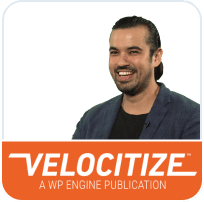

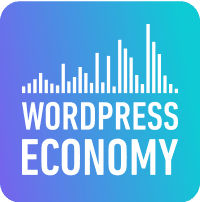

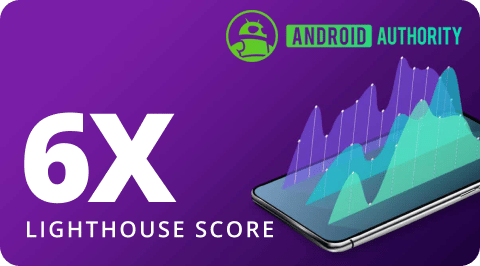

Start the conversation.